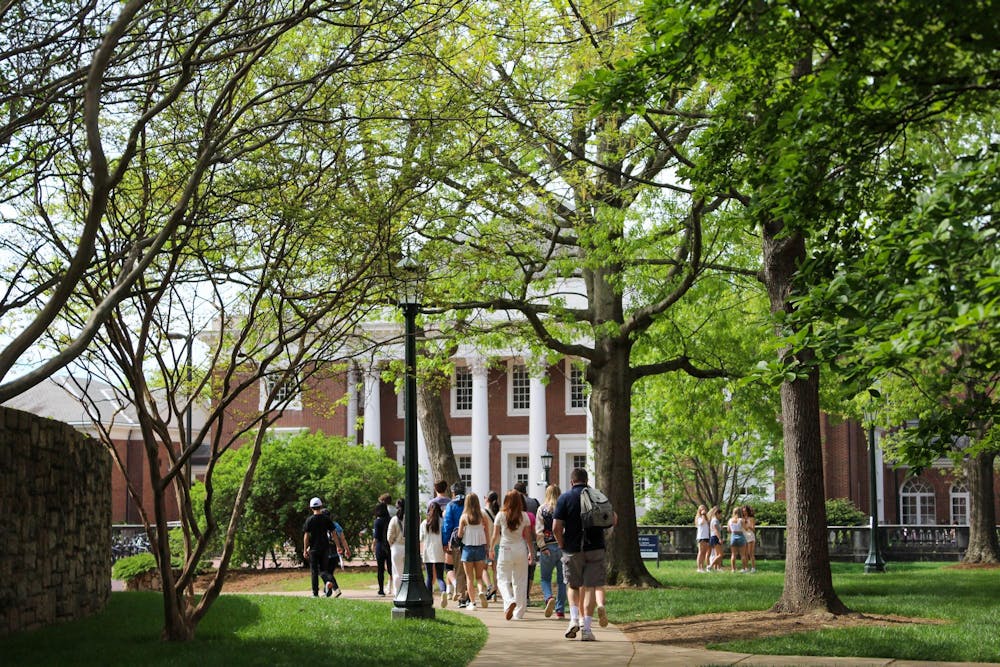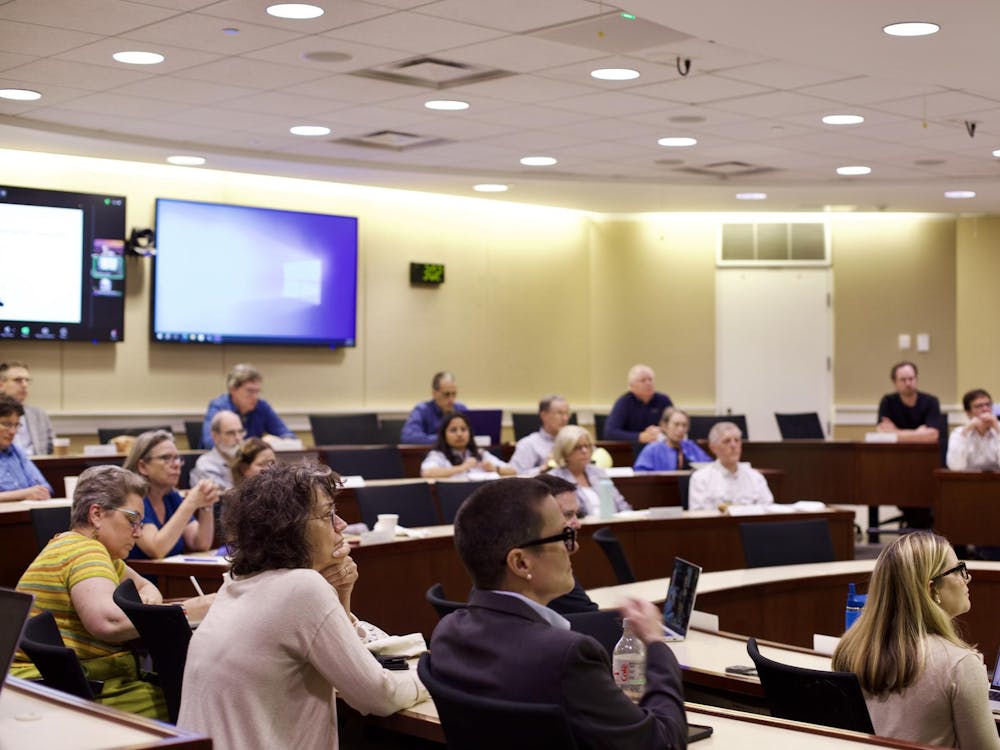At most colleges and universities, tour guides get paid. At the University, a group of students instead volunteer through the University Guide Service to lead hundreds of admission and historical tours each semester — that is, until this fall.
The Guide Service, a Special Status Organization trusted as an agent of the University, announced a semester-long suspension of their student-led admission tours by administration Aug. 28. Some national outlets framed the decision as a result of the tours’ discussions of enslaved labor at the University, while University representatives have maintained that the organization struggled with scheduling and consistency issues. Throughout the spring semester, the University reported frequent no-shows from Guides and a failure for the Guide Service to complete tour sign-ups ahead of an agreed upon deadline.
Prior to the suspension announcement, the Guide Service faced pushback for a perceived negative focus on the University’s history — most notably the work of over 4,000 enslaved laborers who built Thomas Jefferson’s university. One very critical group is The Jefferson Council, a group of alumni whose self-proclaimed mission is “preserving the legacy of Thomas Jefferson.” However, the recent suspension had nothing to do with that criticism, University Spokesperson Brian Coy told The New York Times.
As Guide Service leaders work alongside administration ahead of an anticipated re-launching of updated tours this spring, all prospective students and families will experience Grounds through University-run admission tours. Although still student-guided, these tours are led by interns trained and paid by the Office of Undergraduate Admission.
To examine the differences between Guide Service- and Office of Admission-led prospective student tours, The Cavalier Daily attended three admission tours between Sept. 3 and Sept. 5 to see how the Office of Admission prospective student tour compares to a prospective student tour provided by the Guide Service.
Despite criticism that Guide Service tours focused too heavily on the past, Office of Admission tours also acknowledged the negative impact that the University and its history has had on certain communities. All Office of Admission sessions started with a general admission officer-led presentation featuring a land acknowledgement of the University’s place on former Monacan Nation territory, labeled as a “best practice suggested statement” in presentation footnotes. The content in this presentation has remained consistent throughout the past several years, according to a University spokesperson.
During the introduction, Ellie Saksa, assistant dean of undergraduate admission, said it is important to recognize the freed and enslaved individuals who built the University.
“Without them, there is no us,” Saksa said.
Admission officers also introduced the Memorial to Enslaved Laborers, a monument completed in 2020 to honor the lives of enslaved laborers at the University.
After the introduction from admission officers, Office of Admission interns began the walking portion of the tour. When the tour groups stopped at the Lawn, each intern spoke about the University’s history and traditions, also recognizing the University’s relationship with enslaved laborers. One intern encouraged attendees to engage further with the subject after the tour.
“It is important to acknowledge the University’s complex history in its construction and that enslaved laborers were the ones who built this university, brick by brick,” one Office of Admission intern said. “We don't have time to dive into this rich history during a prospective student tour, but if it is something that interests you, I highly recommend going inside the Rotunda … as well as checking out Monticello.”
The Cavalier Daily obtained a sample tour outline used by the Guide Service which provides a framework for Guides to plan their tours, including route options and scripts for certain topics. Guides are not obliged to follow the outline, and are generally encouraged to develop their own scripts following a probationary training semester.
While the Guide Service document provides similar talking points for Guides regarding the University’s place on Monacan Nation land and its history with enslaved labor, it also included a talking point not covered by Office of Admission interns — white supremacy.
“Unfortunately, white supremacy at U.Va. did not end with emancipation,” the Guide Service document reads.
The Guide Service outline recommends that Guides address the Aug. 11, 2017 “Unite the Right” rally, when white nationalists brandished torches on the Lawn and chanted racist, antisemitic and homophobic chants, including “White Lives Matter” and “Jews will not replace us.” None of the three admission interns mentioned these events.
Multicultural offerings, like the LGBTQ+ student center and Office of African American Affairs, were also featured in the Guide Service outline but not mentioned in the three admission intern tours.
Despite these differences, the content within the Office of Admission tour largely matches that of the Guide Services’, with similar stops and talking points visitors might expect on a college tour, like study abroad options, student research and the housing selection process. Office of Admission tours did highlight the University’s relationship with enslaved labor but dedicated less time to the topic and provided fewer details of more recent racial tensions — like the 2017 Unite the Right Rally — compared to Guide Service tours.
Apart from these topics, the majority of the two tours matched up in terms of content.
Indeed, Vice Provost for Enrollment Stephen Farmer said that the University chose to suspend the Guide Service not out of a desire to shield visitors from the truth of the University’s history, but rather due to the organizations struggle to fill allocated tour slots and adequately staff their tours. Further, Farmer said that while many Guide Service tours received positive feedback, guests have complained about “an excessive and off-putting negativity about the University” expressed by Guides during their tours.
However, Spring 2024 Guide Service tour feedback data obtained by The Cavalier Daily suggests that this sentiment comes from a small percentage of guests and is in relation to aspects of the Guide Service-led tours that are consistent with the design of the Office of Admission tours.
From January through April, the average tour rating for the Guide Service ranged between a four and a 4.6 on a five-point scale, with a general trend showing improvement across the semester. Of the 335 responses, only 13 rated the experience as a two, and nine rated the experience a one.
The bulk of negative comments cited a lack of chances to see inside dorms and other buildings, something Guide Service leaders said the University does not allow and that Office of Admission tours also do not provide.
Just 5.6 percent of negative feedback referenced the “history stop” — the Lawn portion of the tour that typically highlights the Monacan Nation, enslaved labor and August 2017. Out of 15 comments related to historical content, 10 leaned positive and 5 leaned negative, per the tour feedback data.
Further, very few comments from guests accused Guide Service tour leaders of not actually liking the University. According to Jack Giese, co-chair of the Guide Service and fourth-year College student, the Guide Service emphasizes each member’s ability to share their realistic experience, but leaders train guides to draw a line between negativity and honesty.
“I remember when I was touring schools, when I was applying, there were a lot of places I went to where ‘everything was perfect,’” Giese said. “I didn't believe them, to be honest, that's just not how things are.”
While current admission interns receive training and oversight from the Office of Admission, not all of their tours painted the University in an entirely positive light. In the three September tours, students maintained a positive tone yet appeared free to share anecdotes and voice minor frustrations about the University.
One Office of Admission intern said the school’s advising can be hit or miss. Another admitted she nearly transferred after her first semester, but later found the tight-knit community she had been missing.
Office of Admission interns and Guide Service volunteers both ended tours in the same way, with a segment dubbed “Why U.Va?” Each intern and Guide offered a different response to that question.
Davis Taliaferro, co-chair of the Guide Service and fourth-year College student, said Guide Service leaders worked with new Guides to personalize and develop their respective “why U.Va?” segments.
“Every guide has a very beautiful, unique answer for why the space is so special for them, and they put a lot of care and emotion into that in their tours,” Taliaferro said. “We hope that that and our general love for giving these tours reflect that we really do like this University, and we want to share that on admissions tours.”
The Guide Service is working closely with the University on a proposed set of requirements for the organization to be able to lead admission tours in Spring. The current proposal from University administration requires Guides to attend 10 trainings hosted by the Office of Admission, as well as requiring them to submit an outline of their tour plans and conduct a tour shadowed by an Office of Admission or Student Affairs employee.
It is uncertain whether the University plans to reject any outlines based on their content. The future of historical tours conducted by the Guide Service is also unclear, though Guides leadership said they hope to begin conducting historical tours again before the end of this semester.
CORRECTION: A previous version of this article stated that ratings for Guide Service tours ranged from four to four and a half. The actual peak rating was 4.6. The article has been updated to reflect the change.







